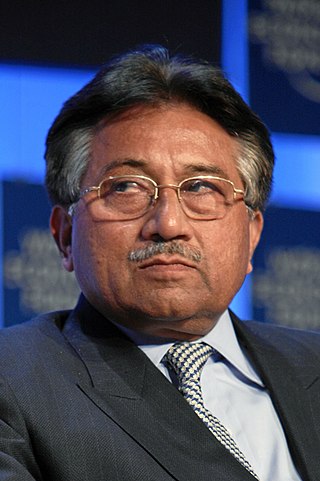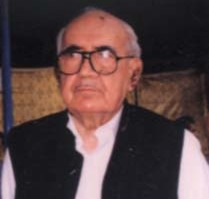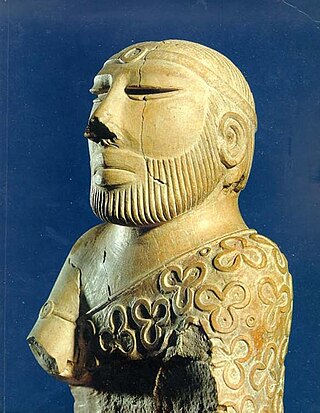
Pervez Musharraf was a Pakistani military general and politician who served as the tenth president of Pakistan from 2001 to 2008. He also served as the 10th Chairman Joint Chiefs of Staff Committee from 1998 to 2001 and the 7th Chief of Army Staff from 1998 to 2007.

Muhammad Zia-ul-Haq was a Pakistani military general who was the sixth president of Pakistan from 1978 until his death in 1988. He remains the country's longest-serving head of state and Chief of Army Staff.

The Pakistan Muslim League (Nawaz) is a centre-right and liberal conservative political party in Pakistan. Alongside the Pakistan Tehreek-e-Insaf (PTI) and Pakistan Peoples Party (PPP), it is one of the three major political parties of the country. The party was founded by former Prime Minister Nawaz Sharif after the dissolution of Islamic Democratic Alliance in 1993. The party's platform is generally conservative, which involves supporting free markets, deregulation, lower taxes and private ownership. Although the party historically supported social conservatism, in recent years, the party’s political ideology and platform has become more liberal on social and cultural issues.

Ghulam Ishaq Khan, was a Pakistani bureaucrat who served as the seventh president of Pakistan, elected in 1988 following Zia's death until his resignation in 1993. He was the founder of his namesake Ghulam Ishaq Khan Institute.

The National Security Council is a federal institutional and consultative body chaired by the Prime Minister of Pakistan as its chairman. The NSC is a principal forum that is mandated for considering national security and foreign policy matters with the senior national security advisers and Cabinet ministers. The idea and inception of National Security Council was first conceived in 1969 under the President Yahya Khan, its functions were to advise and assist the president and prime minister on national security and foreign policies.

General Jehangir KaramatNI(M) HI(M) TBt LoM best known as JK, is a senior Pakistan Army officer who served as the 6th Chief of Army Staff of Pakistan Army, from 12 January 1996 to 6 October 1998. diplomat, public intellectual, and a former professor of political science at the National Defense University. He also served as the 9th Chairman of the Joint Chiefs of Staff Committee from 1997 to 1998.

The 1999 military takeover in Pakistan was a bloodless coup d'état initiated by the military staff at the Joint Staff HQ working under Chairman of the Joint Chiefs of Staff Committee General Pervez Musharraf. The instigators seized control of the civilian government of the publicly elected Prime Minister Nawaz Sharif on 12 October 1999. On 14 October, General Musharraf, acting as the country's Chief Executive, issued a controversial provisional order that suspended the Constitution of Pakistan.

General Muhammad Aziz KhanNI(M) HI(M) SBt TBt, best known as Aziz Khan, is a retired four-star rank army general in the Pakistan Army who served as the 11th Chairman of the Joint Chiefs of Staff Committee, appointed in October 2001 until his retirement in 2005.
The Pakistan coup attempt of 1995 or Operation Khalifa was a secretive plot hatched by renegade military officers and against the government of Benazir Bhutto, the Prime Minister of Pakistan. The plotters aimed to overthrow the constitutional government and establish a Military Rule in Pakistan. The plot was foiled after intelligence agencies tipped off the Pakistan Army. Despite the failure, the coup attempt would weaken Bhutto's government considerably in the aftermath.
Lieutenant General Ali Kuli Khan KhattakHI(M) is a retired Pakistani three-star rank general officer and former field commander of X Corps.

The Muslim League was the original successor of the All-India Muslim League that led the Pakistan Movement to achieve an independent nation. Five of the country's Prime Ministers have been affiliated with this party, namely Liaquat Ali Khan, Khwaja Nazimuddin, M. A. Bogra, Chaudhry Muhammad Ali, and I. I. Chundrigar. The Muslim League was defeated in the 1955 elections to the Constituent Assembly by a political alliance known as the United Front. However, Prime Minister C. M. Ali and Prime Minister Chundrigar were appointed to lead a minority government. The party was dissolved in 1958 after the declaration of Martial Law by General Muhammad Ayub Khan, the Commander-in-Chief of Pakistan Army.
Operation Fair Play was the code name for the 5 July 1977 coup by Pakistan Chief of Army Staff General Muhammad Zia-ul-Haq, overthrowing the government of Prime Minister Zulfikar Ali Bhutto. The coup itself was bloodless, and was preceded by social unrest and political conflict between the ruling leftist Pakistan Peoples Party government of Bhutto, and the right-wing Islamist opposition Pakistan National Alliance which accused Bhutto of rigging the 1977 general elections. In announcing the coup, Zia promised "free and fair elections" within 90 days, but these were repeatedly postponed on the excuse of accountability and it was not until 1985 that ("party-less") general elections were held. Zia himself stayed in power for 11 years until his death in a plane crash.

Military coups in Pakistan were a series of imposition of martial law. It began in 1958 when military officer Muhammad Ayub Khan overthrew and exiled president Iskandar Ali Mirza. Rawalpindi Corps of army was allegedly involved in all the martial laws or military take overs violating the constitution and destroying democratic system in the country, killing of senior politicians, citizens and journalists. Rawalpindi was formerly a small town with no military experience, not seeing enough warfare before British Raj. There was no involvement reported of any other Corps of Pakistan Army in military take overs. There have been numerous successful attempts since 1951. Since its creation in 1947, Pakistan has spent several decades under military rule.

Sartaj Aziz is a Pakistani economist and a strategist, having previously served as the deputy chairman of the Planning Commission of Pakistan, member of the federal cabinet as the de facto Minister for Foreign Affairs, a Federal Senator as well as the National Security Advisor.

The Privatisation process in Pakistan is a continuous policy measure program in the economic period of Pakistan. It was first conceived and implemented by the then-people-elected Prime Minister Nawaz Sharif and the Pakistan Muslim League, in an attempt to enable the nationalised industries towards market economy, immediately after the economic collapse of the Soviet Union in 1989–90. The programme was envisaged and visioned to improve the GDP growth of the national economy of Pakistan, and reversal of the nationalisation programme in 1970s— an inverse of the privatisation programme.

Pakistan began a period of economic liberalisation in the 1990s to promote and accelerate economic independence, development, and GDP growth.
The family of head of state and government in Pakistan is an unofficial title for the family of the head of state or head of government of a country. In Pakistan, the term First Family usually refers to the head of state or head of government, and their immediate family which comprises their spouse and their descendants. In the wider context, the First Family may comprise the head of state or head of government's parents, siblings and extended relatives.
Conservatism in Pakistan, generally relates to the traditional, social, and religious identities in the politics of Pakistan. American historian Stephen Cohen describes several political constants in Pakistan's conservatism: respect for tradition, the rule of law and the Islamic religion which is integral in the idea of Pakistan.
Abdul Majeed Malik was a lieutenant general in the Pakistan Army, World War II veteran, diplomat and later politician who served as minister of Kashmir Affairs & Northern Areas and minister of States & Frontier Regions from 11 July 1997 to 12 September 99. Prior to entering in the political race, he served as a director for military operations at general headquarters. Before the partition, he was a commissioned officer in the British Indian Army. He also drafted 1958 martial law, the first military coup of Pakistan.











